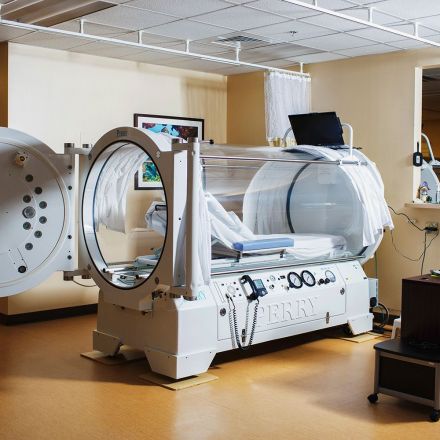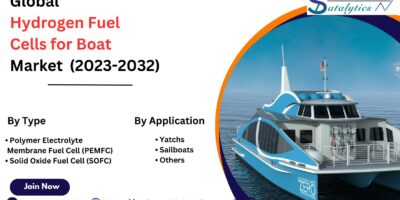Hyperbaric Oxygen Therapy Devices Market Overview
The Hyperbaric Oxygen Therapy (HBOT) Devices Market encompasses devices used for delivering hyperbaric oxygen therapy, a medical treatment where patients breathe 100% oxygen in a pressurized chamber. This therapy increases the amount of oxygen in the bloodstream and is used to treat various medical conditions such as decompression sickness, chronic wounds, infections, carbon monoxide poisoning, and radiation injuries. HBOT enhances healing by increasing oxygen delivery to damaged tissues, reducing inflammation, and improving blood flow.
The market for HBOT devices is expanding due to the increasing prevalence of chronic diseases, advancements in wound care management, and growing awareness of the benefits of hyperbaric oxygen therapy.
Market Trends
- Rising Demand for Wound Care: HBOT is increasingly used in treating chronic, non-healing wounds such as diabetic foot ulcers, pressure ulcers, and venous ulcers. As the incidence of diabetes and other chronic diseases rises globally, the demand for effective wound care solutions is driving the growth of the HBOT devices market.
- Advancements in Portable Hyperbaric Chambers: Recent innovations have led to the development of portable hyperbaric chambers, making the therapy more accessible in outpatient settings and even for home use. These portable devices offer flexibility and convenience, expanding the market beyond traditional hospital-based treatments.
- Increasing Use in Neurological Conditions: Emerging research suggests that HBOT can help in treating neurological conditions such as traumatic brain injuries (TBI), strokes, and cerebral palsy by enhancing oxygen supply to the brain. This expanding application could fuel market growth as studies continue to demonstrate the potential benefits of HBOT in these areas.
- Growing Adoption in Sports Medicine: Athletes are increasingly using HBOT to accelerate recovery from injuries, reduce inflammation, and improve overall performance. The use of HBOT in sports medicine is becoming more common, further driving market growth.
- Insurance Coverage Expansion: As more health insurance providers include hyperbaric oxygen therapy in their coverage for conditions like diabetic foot ulcers and radiation injuries, the accessibility of HBOT treatments is improving, contributing to market growth.
Market Size and Growth
- The global hyperbaric oxygen therapy devices market was valued at approximately USD 3.0-4.0 billion in 2022 and is projected to grow at a compound annual growth rate (CAGR) of 7-9% from 2023 to 2030.
- North America dominates the market due to the high prevalence of chronic wounds, well-established healthcare infrastructure, and growing adoption of HBOT in clinical practices. Europe and Asia-Pacific are also experiencing significant growth, with increasing healthcare investments and awareness of advanced wound care treatments.
Market Dynamics
Drivers
- Rising Prevalence of Chronic Conditions: Chronic diseases like diabetes, cardiovascular diseases, and cancer are becoming more common worldwide. HBOT is particularly effective in treating complications such as diabetic foot ulcers, radiation-induced injuries, and infections. The global rise in these conditions is a major driver of HBOT market growth.
- Technological Advancements in HBOT Devices: Innovations in device design, such as the development of multi-place chambers that allow several patients to receive treatment simultaneously, and the emergence of lightweight, portable chambers, are expanding the reach of HBOT therapy.
- Growing Geriatric Population: The aging global population is more susceptible to conditions that benefit from HBOT, such as chronic wounds and ischemic strokes. As the elderly population increases, so does the demand for advanced therapeutic interventions like HBOT.
- Expanded Use in Radiation Therapy Complications: HBOT is becoming a standard treatment for managing late radiation therapy complications, such as radiation proctitis, cystitis, and soft tissue necrosis. This has broadened the scope of HBOT’s application in cancer care.
Restraints
- High Cost of HBOT Equipment: The cost of purchasing and maintaining hyperbaric oxygen chambers is substantial, especially for multi-place chambers used in hospital settings. This can be a barrier for small healthcare facilities and clinics, limiting the availability of HBOT services.
- Limited Awareness in Developing Regions: In many developing countries, the awareness and adoption of hyperbaric oxygen therapy are still limited. This restricts market penetration, particularly in regions with less advanced healthcare infrastructures.
- Potential Side Effects and Contraindications: While HBOT is generally safe, potential side effects such as ear barotrauma, oxygen toxicity, and temporary vision changes can limit its use in certain patients. Additionally, some individuals with conditions like untreated pneumothorax cannot undergo HBOT, which can restrict its application.
Opportunities
- Expansion in Emerging Markets: With the growing healthcare infrastructure in emerging markets, there is a significant opportunity for HBOT devices to be adopted in regions such as Asia-Pacific, Latin America, and the Middle East. Increasing healthcare investments and rising awareness of advanced therapeutic treatments provide growth opportunities.
- Integration with Other Therapies: Combining HBOT with other advanced wound care technologies such as negative pressure wound therapy (NPWT) or stem cell therapy could improve treatment outcomes and expand its application.
- Increasing Use in Military and Emergency Care: HBOT is being explored for treating military personnel suffering from traumatic brain injuries (TBI) and blast injuries. Its application in emergency care, such as carbon monoxide poisoning or decompression sickness in divers, presents growth potential.
Challenges
- Regulatory Hurdles: Obtaining regulatory approval for new HBOT devices can be time-consuming and costly. Stringent safety and efficacy standards must be met, which can delay the introduction of new products to the market.
- Lack of Standardized Protocols: There is a lack of uniform protocols for the use of HBOT in different medical conditions, which can lead to inconsistent treatment practices and limit its widespread adoption in certain regions.
Click Here, To Get Free Sample Report https://stringentdatalytics.com/sample-request/hyperbaric-oxygen-therapy-devices-market/14262/
Market Segmentations:
Global Hyperbaric Oxygen Therapy Devices Market: By Company
ETC BioMedical Systems
Fink Engineering
Gulf Coast Hyperbarics
OxyHeal
Perry Baromedical
Global Hyperbaric Oxygen Therapy Devices Market: By Type
Monoplace Hyperbaric Oxygen Therapy Devices
Multiplace Hyperbaric Oxygen Therapy Devices
Global Hyperbaric Oxygen Therapy Devices Market: By Application
Wound Healing
Infection Treatment
Gas Embolism
Decompression Sickness
Others
Global Hyperbaric Oxygen Therapy Devices Market: Regional Analysis
The regional analysis of the global Hyperbaric Oxygen Therapy Devices market provides insights into the market’s performance across different regions of the world. The analysis is based on recent and future trends and includes market forecast for the prediction period. The countries covered in the regional analysis of the Hyperbaric Oxygen Therapy Devices market report are as follows:
North America: The North America region includes the U.S., Canada, and Mexico. The U.S. is the largest market for Cold-chain Pharma in this region, followed by Canada and Mexico. The market growth in this region is primarily driven by the presence of key market players and the increasing demand for the product.
Europe: The Europe region includes Germany, France, U.K., Russia, Italy, Spain, Turkey, Netherlands, Switzerland, Belgium, and Rest of Europe. Germany is the largest market for Cold-chain Pharma in this region, followed by the U.K. and France. The market growth in this region is driven by the increasing demand for the product in the automotive and aerospace sectors.
Asia-Pacific: The Asia-Pacific region includes Singapore, Malaysia, Australia, Thailand, Indonesia, Philippines, China, Japan, India, South Korea, and Rest of Asia-Pacific. China is the largest market for Cold-chain Pharma in this region, followed by Japan and India. The market growth in this region is driven by the increasing adoption of the product in various end-use industries, such as automotive, aerospace, and construction.
Middle East and Africa: The Middle East and Africa region includes Saudi Arabia, U.A.E, South Africa, Egypt, Israel, and Rest of Middle East and Africa. The market growth in this region is driven by the increasing demand for the product in the aerospace and defense sectors.
South America: The South America region includes Argentina, Brazil, and Rest of South America. Brazil is the largest market for Cold-chain Pharma in this region, followed by Argentina. The market growth in this region is primarily driven by the increasing demand for the product in the automotive sector.
Key Points:
- Define, describe and forecast The Global Market by type, application, end user and region.
- Provide enterprise external environment analysis and PEST analysis.
- Provide strategies for company to deal with the impact of COVID-19.
- Provide market dynamic analysis, including market driving factors, market development constraints.
- Provide market entry strategy analysis for new players or players who are ready to enter the market, including market segment definition, client analysis, distribution model, product messaging and positioning, and price strategy analysis.
- Keep up with international market trends and provide analysis of the impact of the COVID-19 epidemic on major regions of the world.
- Analyze the market opportunities of stakeholders and provide market leaders with details of the competitive landscape.
Click Here, To Buy Premium Report https://stringentdatalytics.com/purchase/hyperbaric-oxygen-therapy-devices-market/14262/?license=single
Reasons to Purchase this Market Report:
- The competitive environment includes the proportions of important players, recent innovations, and strategy.
- Companies with extensive product offerings, pertinent financial data, recent advancements, SWOT analyses, and player tactics.
- Quantitative, qualitative, value (in USD million), and volume (in units million) data are among the segments and sub-segments.
- The research contains a wealth of data, including market dynamics and opportunities throughout the forecast period.
- Data at the regional, sub-regional, and national levels also provides information on the market’s supply and demand dynamics.
About Stringent Datalytics
Stringent Datalytics offers both custom and syndicated market research reports. Custom market research reports are tailored to a specific client’s needs and requirements. These reports provide unique insights into a particular industry or market segment and can help businesses make informed decisions about their strategies and operations.
Syndicated market research reports, on the other hand, are pre-existing reports that are available for purchase by multiple clients. These reports are often produced on a regular basis, such as annually or quarterly, and cover a broad range of industries and market segments. Syndicated reports provide clients with insights into industry trends, market sizes, and competitive landscapes. By offering both custom and syndicated reports, Stringent Datalytics can provide clients with a range of market research solutions that can be customized to their specific needs.
Contact Us
Stringent Datalytics
Contact No- +1 346 666 6655
Email Id- sales@stringentdatalytics.com




Leave a Reply